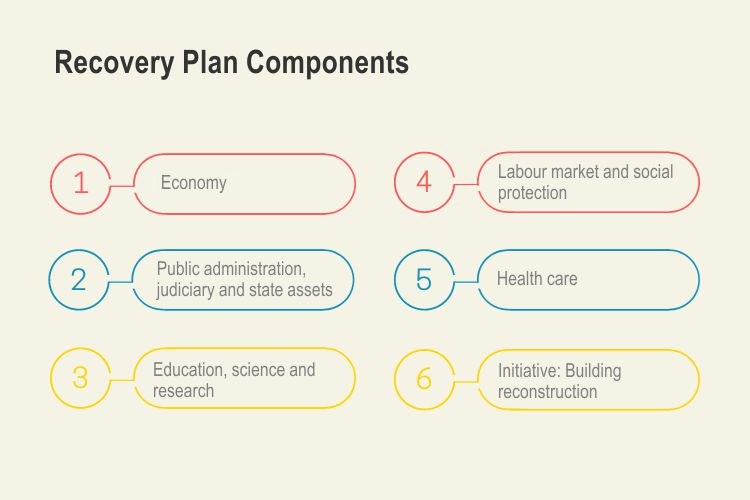National Recovery and Resilience Plan (Initiative: Building reconstruction)
The Government adopted the National Recovery and Resilience Plan 2021-2026 (NPOO), approved by the European Commission in July 2021. The National Plan contains project proposals in six areas totalling HRK 48.2 billion.
The plan is structured to include five components and one initiative:
-
Economy
-
Public administration, judiciary and state assets
-
Education, science and research
-
Labour market and social protection
-
Health care
-
Initiative: Building reconstruction
At its session held on 8 July 2021, the Government adopted the Decision on the management and monitoring system for the implementation of activities under the National Recovery and Resilience Plan 2021-2026 laying down the institutional framework and procedures linked to coordination relating to the implementation of activities under the National Recovery and Resilience Plan 2021-2026 within the framework for economic governance of the European Union - the Recovery and Resilience Mechanism at the level of the Government of the Republic of Croatia. The Decision also determines institutions that perform functions of management, coordination and monitoring of the implementation of activities under the National Recovery and Resilience Plan and other bodies, as well as their functions and responsibilities.
In accordance with the Government Decision, the Ministry of Physical Planning, Construction and State Assets is the competent authority for Component C6. Initiative: Building reconstruction. The initiative includes 6 reform measures and 4 investments with a total estimated investment value of HRK 5.95 billion. The component ensures full transformation in the buildings sector including earthquake reinforcement and energy efficiency of buildings.
In the midst of the pandemic, Croatia was also hit by two devastating earthquakes that caused significant material damage and afflicted many citizens who were forced to leave their homes temporarily or permanently. The estimated damage caused by the earthquakes in Zagreb and the Banovina region amounts to approximately HRK 129 billion, which is almost the annual amount of the state budget. Therefore, for citizens in earthquake-affected areas, as well as for public finances, this will be an important challenge in the years ahead. Croatia is in the process of reconstruction and revitalization of affected areas, and the goal is not only restoration of the original state, but full transformation in the buildings sector with seismic reinforcement and energy efficiency of buildings. The goal is to build back better and more robust construction works to be more resistant to potential new earthquakes tomorrow.
The programmes covered by this component of the recovery and resilience plan will foster the overall reconstruction of buildings and highly efficient alternative systems. Particular attention will be paid to ensuring healthy indoor climate conditions, fire protection and risks associated with enhanced seismic activity. The objective of this Initiative is to contribute to the wave of reconstruction of buildings, which implies transformation into an energy-efficient and decarbonised building stock. Reconstruction will include residential and non-residential buildings, as well as public buildings, taking into account the importance of public interest for health and educational buildings. Investments under the recovery and resilience plan will contribute to more effective post-earthquake reconstruction and seismic safety of buildings.
With regard to 2021, the Ministry of Physical Planning, Construction and State Assets fulfilled all the required indicators, adopted necessary implementation programmes and established one-stop shops (single points of contact for citizens). In the next implementation phase the preparation of sub-indicators is to follow, in order to implement the planned indicators for 2022 by the end of this year.
For Component C6. Initiative: Building reconstruction, the anticipated indicators (that is, milestones) were realised within the deadline for completion by 31 December 2021, and they related to:
-
Adoption of national energy renovation programmes for:
-
Energy renovation programme for multi-dwelling buildings for the period up to 2030
-
Energy renovation programme for buildings with cultural property status for the period up to 2030
-
Programme to combat energy poverty that includes the use of renewable energy sources in residential buildings in supported areas and areas of special state concern for the period up to 2025
-
-
Adoption of national programmes:
-
Programme for the development of circular spatial and building management for the period from 2021 to 2030
-
Programme for green infrastructure development in urban areas for the period 2021-2030
-
The programmes were adopted by the Government of the Republic of Croatia at the proposal of the Ministry and they refer to the forthcoming ten-year period. The first three years of programme implementation and the award of grants to beneficiaries are planned to be financed from the Recovery and Resilience Mechanism, according to clearly defined indicators.
Establishment of a physical office of the single contact centre for energy renovation and seismic reinforcement
The one-stop shop reform that aims at providing adequate services to citizens and building owners will reduce the administrative burden on stakeholders during the post-earthquake reconstruction process and digitize the process. The first phase of this reform was the establishment of four physical offices of the single contact centre. This activity included adaptation and modernisation of physical infrastructure at the location where counter operation was established, staff training, training of the public bodies involved and promotional activities. Four one-stop shop offices were established in Zagreb (Kneza Mislava 2), Sisak (Ivana Kukuljevića Sakcinskog 1), Glina (Trg bana Josipa Jelačića 2) and Petrinja (Trg Stjepana Radića 8).
The deadline for the implementation of investments under the NPOO is 30 June 2026.
